The Well-Tempered Ear
Classical music: The Wisconsin Baroque Ensemble opens its new season with rarities beautifully performed | October 18, 2016
By Jacob Stockinger
Here is a special posting, a review written by frequent guest critic and writer for this blog, John W. Barker. Barker (below) is an emeritus professor of Medieval history at the University of Wisconsin-Madison. He also is a well-known classical music critic who writes for Isthmus and the American Record Guide, and who hosts an early music show once a month on Sunday morning for WORT-FM 89.9. For years, he served on the Board of Advisors for the Madison Early Music Festival and frequently gives pre-concert lectures in Madison. Barker also took the performance photos in the review.
By John W. Barker
The season opener for the Wisconsin Baroque Ensemble was held last Saturday night at the historic Gates of Heaven Synagogue, in James Madison Park on East Gorham Street.
An unusual feature of the program this time was a kind of running backbone: the music of the little-known 18th-century French composer Benoît Guilemant.
From a collection of duo miniatures for flute and violin, six short pieces were sprinkled through the program. There was also a larger work of his, a Quartet Sonata, Op. 1, No. 3, for two flutes and violin with basso continuo. All these were spirited, clever and imaginative pieces that greatly delighted the audience.
The French Baroque was further represented by a cantata by François Bouvard (1684-1760), sung by mezzo-soprano Consuelo Sañudo, with flutist Brett Lipshutz and violinist Nathan Giglierano taking obligato parts.
The other veteran singer involved, soprano Mimmi Fulmer, delivered a pungent Italian mini-cantata by Barbara Strozzi (1619-1677).
And, from the German Baroque scene, there was a fine Trio Sonata, Op. 1, No. 2, by the great Dieterich Buxtehude (1637-1707). You can hear it in the YouTube video at the bottom.
The earliest music in the program was provided by Claudio Monteverdi: first, the delicious concertato madrigal, “Chiome doro” from the Seventh Book (1619); then three delightful pieces from the earlier Scherzi Musicali of 1607.
The ensemble this time consisted of eight performers. Besides the two singers and the two instrumentalists named, there were regulars like Eric Miller (viola da gamba), Monica Steger (flute, recorder, harpsichord), Anton TenWolde (cello), and Max Yount (harpsichord). Violinist Giglierano is a new presence in the group, and it seems as if he will be returning to the fold later this season.
One hates to think that the audience was somewhat smallish due to football. But it was a lively and—as always and justly—an appreciative one.
Tags: Arts, Barbara Strozzi, Baroque, Benoit Guillemant, Cantata, Cello, Chamber music, Classical music, Claudio Monteverdi, Dietrich Buxtehude, Early music, flute, France, Francois Bouvard, French, Gates of Heaven, German, harpsichord, historic, Isthmus, Italian, Italy, Jacob Stockinger, Madison, Madison Early Music Festival, madrigal, MEMF, Mezzo-soprano, Music, recorder, scherzi, Sonata, soprano, synagogue, trio, trio sonata, United States, University of Wisconsin-Madison School of Music, University of Wisconsin–Madison, Viola, viola da gamba, Violin, vocal music, Wisconsin, Wisconsin Baroque Ensemble, WORT-FM 89.9, YouTube
2 Comments »
Leave a comment Cancel reply
This site uses Akismet to reduce spam. Learn how your comment data is processed.
- April 2024
- March 2024
- February 2024
- January 2024
- December 2023
- November 2023
- October 2023
- September 2023
- August 2023
- July 2023
- June 2023
- May 2023
- April 2023
- March 2023
- February 2023
- January 2023
- December 2022
- October 2022
- September 2022
- June 2022
- May 2022
- April 2022
- March 2022
- July 2021
- June 2021
- May 2021
- April 2021
- March 2021
- February 2021
- January 2021
- December 2020
- November 2020
- October 2020
- September 2020
- August 2020
- July 2020
- June 2020
- May 2020
- April 2020
- March 2020
- February 2020
- January 2020
- December 2019
- November 2019
- October 2019
- September 2019
- August 2019
- July 2019
- June 2019
- May 2019
- April 2019
- March 2019
- February 2019
- January 2019
- December 2018
- November 2018
- October 2018
- September 2018
- August 2018
- July 2018
- June 2018
- May 2018
- April 2018
- March 2018
- February 2018
- January 2018
- December 2017
- November 2017
- October 2017
- September 2017
- August 2017
- July 2017
- June 2017
- May 2017
- April 2017
- March 2017
- February 2017
- January 2017
- December 2016
- November 2016
- October 2016
- September 2016
- August 2016
- July 2016
- June 2016
- May 2016
- April 2016
- March 2016
- February 2016
- January 2016
- December 2015
- November 2015
- October 2015
- September 2015
- August 2015
- July 2015
- June 2015
- May 2015
- April 2015
- March 2015
- February 2015
- January 2015
- December 2014
- November 2014
- October 2014
- September 2014
- August 2014
- July 2014
- June 2014
- May 2014
- April 2014
- March 2014
- February 2014
- January 2014
- December 2013
- November 2013
- October 2013
- September 2013
- August 2013
- July 2013
- June 2013
- May 2013
- April 2013
- March 2013
- February 2013
- January 2013
- December 2012
- November 2012
- October 2012
- September 2012
- August 2012
- July 2012
- June 2012
- May 2012
- April 2012
- March 2012
- February 2012
- January 2012
- December 2011
- November 2011
- October 2011
- September 2011
- August 2011
- July 2011
- June 2011
- May 2011
- April 2011
- March 2011
- February 2011
- January 2011
- December 2010
- November 2010
- October 2010
- September 2010
- August 2010
- July 2010
- June 2010
- May 2010
- April 2010
- March 2010
- February 2010
- January 2010
- December 2009
- November 2009
- October 2009
- September 2009
- August 2009
Archives
- 2,486,731 hits
Blog Stats
- How did pianist Yuja Wang’s heart respond to playing Rachmaninoff? April 20, 2024
- A biopic about Vivaldi is in the works April 18, 2024
- Pianist Lang Lang gets a Hollywood star April 16, 2024
- Muti to conduct an opera academy in China April 15, 2024
- ‘Lord of the Rings’ to become an opera April 13, 2024
Recent Posts
Recent Comments
Tags
#BlogPost #BlogPosting #ChamberMusic #FacebookPost #FacebookPosting #MeadWitterSchoolofMusic #TheEar #UniversityofWisconsin-Madison #YouTubevideo Arts audience Bach Baroque Beethoven blog Cello Chamber music choral music Classical music Compact Disc composer Concert concerto conductor Early music Facebook forward Franz Schubert George Frideric Handel Jacob Stockinger Johannes Brahms Johann Sebastian Bach John DeMain like link Ludwig van Beethoven Madison Madison Opera Madison Symphony Orchestra Mead Witter School of Music Mozart Music New Music New York City NPR opera Orchestra Overture Center performer Pianist Piano post posting program share singer Sonata song soprano String quartet Student symphony tag The Ear United States University of Wisconsin-Madison School of Music University of Wisconsin–Madison Viola Violin vocal music Wisconsin Wisconsin Chamber Orchestra wisconsin public radio Wolfgang Amadeus Mozart YouTube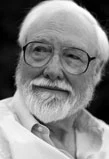
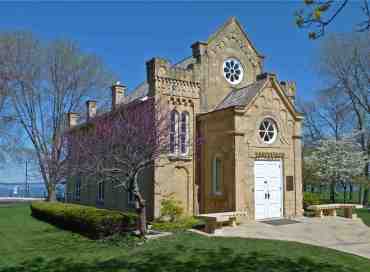
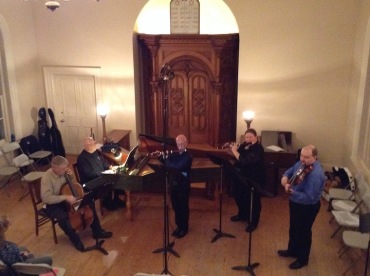
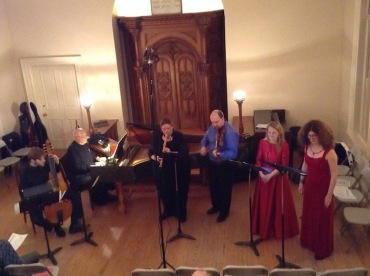
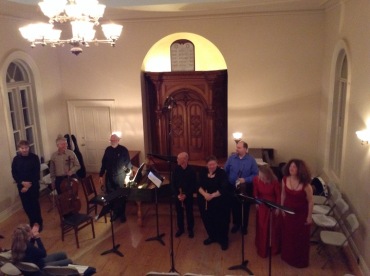
I guess “musica obscura” doesn’t come cheaply either: with tickets for this group at $20 for adults (apparently no discount for seniors) and $10 for students.
This is the kind of concert that is free in Europe.
LikeLike
Comment by FFlambeau — October 18, 2016 @ 6:16 am
I am sure this was a delightful performance and fun to play but this group, in my opinion, needs to ask what is its mission/role? (Even looking at their web site it appears that fun in performing obscure Baroque works seems to predominate. Not once are the words education, or outreach used). So, if the mission of the group is to perform this was likely a very successful concert. But if the group’s mission was to educate, or to reach out, it was an absolute failure. That is shown in the photos of what appears to be a largely missing audience and by the polite way the reviewer is telling the readers the audience was tiny.
Probably the program itself was part of the problem; probably timing (yes, the big football game likely would have an impact on attendance). That should be quite obvious. The group’s own web site makes a playful, but surprisingly accurate comment on their musical selections: “musica obscura”. Now, there is nothing wrong in playing good music that has been neglected by others in the concert hall and on the radio (and other media). But the fact that this group was performing no less than 7 pieces by a truly obscure composer (Benoît Guilemant) should, one would think, have raised some red flags. (I looked for some Youtubes for Guilemant and could find none (zero); plus, zero biographical information available. That’s a bad sign, generally speaking.).
If one is looking to educate and to reach out to others (Baroque music really is beautiful and deserves a larger audience than it has) then perhaps it is necessary to mix in less of the completely obscure and more of the familiar. A piece or two by any of the Bachs, by Handel, or by the likes of Telemann PLUS a selection or two from the obscure likely would work much better.
But then, it depends on what the mission of the group is. If it is simply one of performance and playing as a group together: this concert was likely a great success. Otherwise, not.
LikeLike
Comment by FFlambeau — October 18, 2016 @ 2:10 am